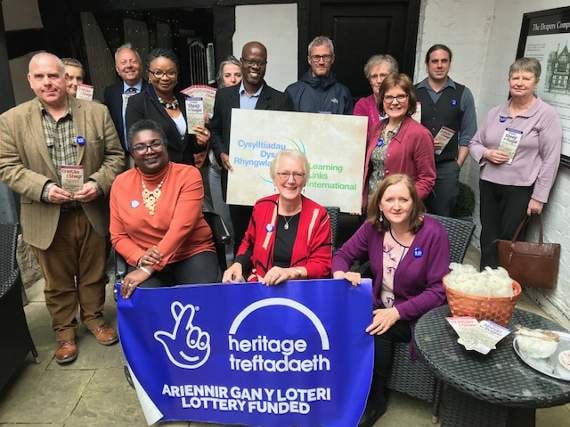What is Dolgellau’s connection to the transatlantic slave trade?
It may not be the first place that comes to mind when considering the history of Britain’s role in slavery, but a new project is seeking to delve deeper into the connection between the wool trade in areas of Wales like Dolgellau and the experiences of enslaved people in the Caribbean and British North America – starting with the fabric that they wore.
‘From Sheep to Sugar – Welsh Wool and Slavery’ is investigating the role that weavers in these areas played in producing clothes for slaves working on plantations during the 18th century.
‘Welsh Plains’ were reams of heavy woollen fabric allocated to enslaved people to wear during lengthy periods of unforgiving outdoor labour.
These cloths were produced in wool mills across Wales from the latter half of the 1600s to the 1800s, including in Dolgellau, known for its once-thriving wool industry which played a key part in the town’s development.
Project advisor and author of Slave Wales, which examines the role that Wales played in the slave trade, Professor Chris Evans, explained: “Woollens, called ‘Welsh Plains’ or ‘Webs’, were produced in mid-Wales in the 18th century, and played a vital role in clothing enslaved peoples in the Caribbean.
“Yet making ‘Negro Cloth’, as this historic Welsh product was also known, was a vital money-earner for impoverished rural households in Montgomeryshire and Merionethshire.”
Originally a relatively small-scale cottage industry supplying local and Western European needs, the wool trade in Wales expanded considerably in response to demands from merchants in Liverpool and Bristol, who travelled great distances to purchase Welsh Plains directly from weavers.
Families in rural areas sought ways of boosting their incomes by spinning and weaving to meet these growing demands, and in doing so their labour became a part of the supply chain for the ‘Plantation Trade’.
At the height of industry productivity, Welsh cottage weavers were exporting almost eight million yards of this woollen cloth per year.
Liz Millman is the founder of Learning Links International, a social enterprise that champions creative ways to make links between Wales and Jamaica and other countries around the Atlantic.
She got involved with the ‘From Sheep to Sugar’ project after spending time in Wales and becoming more and more intrigued by these shared histories.
Liz saw the project as an opportunity to shed light on an otherwise obscure chapter in the history of Wales: “Currently the telling of Welsh history mainly overlooks the significant involvement of Welsh people in the Trans-Atlantic Slave Trade and the support given through the plantation trade to provide goods.
“Fortunes were made by some, but many impoverished hill farming families came to depend on the work export trade to survive and pay the tithes and rent in the harsh economic conditions at the time in Wales.”
At a time in which British institutions and industries are increasingly seeking to interrogate and re-evaluate their own role in upholding the structures of slavery and oppression, the project might raise questions over the complicity of those involved in the Welsh wool industry in perpetuating the global slave trade.
Liz noted that this is an important aspect of what the project is hoping to achieve: “I developed the research project as a way to help people think about the implications of the way people from England, Wales, Scotland and other European countries created and colluded and maintained for so long a horrendous trade in human life.
“It is estimated that 12 million men, women and children were transported from Africa in awful conditions, to live awful lives in chattel slavery, having no human rights at all, just so the European people could have the luxury of sugar in their chocolate drinks and tea, and for many the creation of wealth beyond their dreams.
“Today, African countries still suffer from the destabilisation of their communities over that time.”
The project began with two years of meetings with spinners, weavers and dyers ad consultations with museums and local historians.
With the help of a grant from the National Lottery Heritage Fund, ‘From Sheep to Sugar’ has now recruited over 50 community research volunteers to work with local libraries, archivists and specialist advisors to paint a richer picture of rural life in Wales during the era of the early wool trade.
On the work, Liz said: “People are genuinely fascinated and surprised by the unlikely fact that enslaved people in tropical countries were provided with Welsh Plains.”
For more information on the project, visit www.welshplains.cymru




